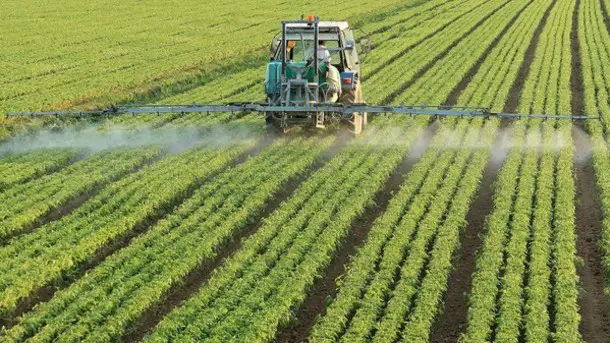Contributing Writer for Wake Up World
No doubt about it, we’re living in an increasingly toxic world. From insecticides, fungicides, and herbicides to pollution from fossil fuels and nuclear plants, it’s becoming near impossible to dodge the toxic assault. The poisons are not only on agricultural fields, but also in our oceans, homes, schools, parks, forests, roads and playgrounds.
Even so, we can reduce exposure by paying attention to the food we eat and the water we drink. A perfect example of this is a family in Sweden who decided to take a 21-day all-organic diet challenge. The results may surprise you.
The modern era of cancer, ADHD and endocrine disruption
With the release of Rachel Carson’s book Silent Spring in 1962, the general public was made aware of the damaging effects of pesticides on human and environmental health.
Over fifty years later, we may not be in active contact with DDT as much as in Carson’s time, but exposure to equally harmful pesticides has increased exponentially.
According to Toxics Action Center:
“Chronic health effects may occur years after even minimal exposure to pesticides in the environment, or result from the pesticide residues which we ingest through our food and water. A July 2007 study conducted by researchers at the Public Health Institute, the California Department of Health Services, and the UC Berkeley School of Public Health found a sixfold increase in risk factor for autism spectrum disorders (ASD) for children of women who were exposed to organochlorine pesticides.”
Moreover, scientists from the University of Montreal and Harvard University found that ingestion of pesticide residues on produce may double a child’s risk of attention deficit hyperactivity disorder (ADHD), a syndrome that causes disruptive inattention, abnormally active behavior and impulsivity.
And studies by the National Cancer Institute discovered that American farmers, who are known for their liberal use of agricultural pesticides, have a high incidence of Hodgkins disease, non-Hodgkins lymphoma, leukemia, as well as other types of cancer.
Nowhere to hide
Pesticides are now found everywhere, from our food and soil, to water and even human breast milk. The toxins are associated with a spectrum of health disorders, including:
- Headaches
- Nausea
- Cancer
- Reproductive harm
- Developmental delays
- Endocrine disruption
- Multiple Chemical Sensitivity (MCS)
- Birth defects
- Impaired brain development
Environmental consequences
Not only do pesticides wreak havoc on human health, they also destroy the environment. The toxins damage agricultural land by harming beneficial insects, soil microorganisms and worms — all of which contribute to healthy soil and naturally limit detrimental pests. Plant root and immune systems are also negatively impacted by pesticides, as are concentrations of important nutrients such as nitrogen and phosphorous.
A personal solution to the issue of pesticides
Despite what our governmental regulatory agencies would have us believe, chemical pesticides simply are not safe — at any level. Until we can establish sustainable, organic farming practices and pest control across the board, it’s up to us to limit exposure to the toxins as best we can. An excellent place to begin is with a completely organic diet. A Swedish family has done just that by participating in a three-week trial of switching from conventional food to fully organic.
The Palmbergs normally subscribe to a non-organic diet, simply because they feel organic food is much too expensive. But when the Swedish grocery chain Coop decided to enlist a family into The Organic Effect experiment, they decided to give it a try.
For the first week, the family ate their standard non-organic meals, and provided urine samples each day to establish a baseline of toxicity. Independent lab test performed by the Swedish Environmental Research Institute found that eight of the chosen 12 pesticides were in their systems. This included a number of insecticides, fungicides and plant growth regulators.
Next, the Palmbergs adopted a 100% organic diet for the remaining two weeks. Urine samples were again taken daily. Incredibly — within just a few days — almost all the pesticides were completely gone from their systems.
But it isn’t just Coop that’s interested in the effects of an organic diet, research published in Environmental Research found that a single week of eating mostly organic food reduced pesticide levels by nearly 90% in Australian adults. Likewise, this study study evaluated 4,466 participants and had similar findings.
All in all, it pays to embrace a 100% organic diet in terms of the environment and our health. As Mark DeNicola stresses in the article, This Is What Happens To Your Body When You Switch To Organic Food:
“Living in a world dominated by affordability and convenience, far too many of us are casting aside what we know to be beneficial for our health. This is not only helping to create the first generation of children who will not outlive their parents, but is also keeping organic produce at its higher price point.
“The more we collectively demand to eat organic, the closer we come to a world where organically grown produce once again becomes the norm and the standard. In that world, more attention would be placed on finding ways to grow and produce organics more efficiently, hopefully making it more affordable in the process.”
The Organic Effect
Article sources:
- www.coop.se/organiceffect
- www.toxicsaction.org/problems-and-solutions/pesticides
- www.collective-evolution.com/…what-happens-to-your-body-when-you-switch-to-organic-food
- www.sciencedirect.com/science/article/pii/S001393511400067X
- www.ehp.niehs.nih.gov/wp-content/uploads/advpub/2015/2/ehp.1408197.acco.pdf
- www.fastcocreate.com/…what-happens-to-your-body-when-everything-you-eat-is-organic
Previous articles by Carolanne:
- Is Roundup Driving The Autism Epidemic? Leading MIT Researcher Says YES
- Over 100 Scientific Studies Agree: Cannabis Annihilates Cancer
- Emotional Energetic Healing: The Future of Medicine is Here
- Why Every Parent Should Consider Unschooling
- The Greenhouse of the Future: Grow Your Own Food Year-Round With This Revolutionary System
- First U.S. City Produces More Electricity Than It Uses — With 100% Renewable Technology
- Dry Skin Brushing Can Strengthen Immunity, Spark Detoxification and Reverse Aging
- Autistic Boy with Higher IQ Than Einstein Discovers Gift After Removal from State-Run Therapy
- Enhance Spiritual, Mental and Physical Well-being with a Pineal Gland Detox
- DIY $2 Self-Watering Garden Bed – Grow Produce Easily, Even in the Toughest Conditions
- How Being Too Clean Can Lead to Cancer, Multiple Sclerosis, Celiac Disease and More
About the author:
I’m Carolanne — a writer, chef, traveler and enthusiastic advocate for sustainability, organics and joyful living. It’s good to have you here. If you would like to learn more, connect with me at Thrive-Living.net or visit Twitter.com/Thrive_Living.

If you've ever found value in our articles, we'd greatly appreciate your support by purchasing Mindful Meditation Techniques for Kids - A Practical Guide for Adults to Empower Kids with the Gift of Inner Peace and Resilience for Life.
In the spirit of mindfulness, we encourage you to choose the paperback version. Delve into its pages away from screen glare and notifications, allowing yourself to fully immerse in the transformative practices within. The physical book enriches the learning process and serves as a tangible commitment to mindfulness, easily shared among family and friends.
Over the past few years, Wake Up World has faced significant online censorship, impacting our financial ability to stay online. Instead of soliciting donations, we're exploring win-win solutions with our readers to remain financially viable. Moving into book publishing, we hope to secure ongoing funds to continue our mission. With over 8,500 articles published in the past 13 years, we are committed to keeping our content free and accessible to everyone, without resorting to a paywall.











